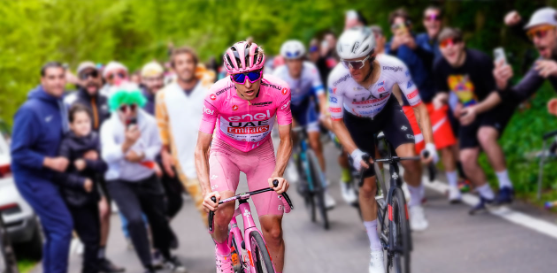On May 9, 2025, Albania made history by hosting one of the world’s most prestigious cycling events—Giro d’Italia. This century-old race had never before started outside of Italy. Starting from Durrës, the 3-day itinerary was a proud moment for the country, placing Albania at the center of the international sports scene and offering a chance to promote tourism. However, behind the festive image, the event was marred by significant issues. Media reports revealed that hundreds of Albanians experienced days of chaos, roadblocks, and frustration. Citizens, businesses, public transportation, emergency services, even the Central Election Commission’s distribution of election materials, faced delays and disruptions, all on the eve of Albania’s May 11 parliamentary elections, a crucial institutional moment.
The race itself wasn’t without incidents. During the fast descents of Stage One, several crashes occurred, including a serious injury to Spanish cyclist Mikel Landa, who withdrew due to a spinal fracture. Other athletes criticized the poor quality of the roads and the unfavourable racing conditions.
What Lies Behind the Curtain?
The decision to host this event was made, as with many others in the past 12 years, to serve the prime minister’s interests. For the first time, the event was referenced in Normative Act No. 5, dated December 19, 2024, which amended the 2024 budget to allocate 100 million ALL for the race. Five days later, Decision of the Council of Ministers (DCM) No. 796, dated December 23, 2024, approved the composition of an inter-institutional working group and outlined the fund usage procedures. However, the group’s outcomes remain unknown to the public. There’s no transparency about the selection criteria for the race itinerary or other publicly relevant aspects.
There is no official public balance sheet or forecast on the event’s costs and benefits, even though it is funded by taxpayer money. The entire management of the race appears personalized, shaped by the prime minister’s preferences. The political significance of Giro d’Italia's launch in Albania becomes even clearer when considering the overlap between the race and the May 11 parliamentary elections—the same day the race arrives in Vlorë. The arrival of the “pink caravan” thus becomes a powerful electoral tool favoring the ruling government.
According to Il Fatto Quotidiano in an article dated May 9 (“Il Giro d’Italia 2025 parte in Albania: chiara la partita politica che si gioca alle spalle dei corridori”), this political exploitation is evident. Two months before the race, DCM No. 147, dated March 6, 2025, approved an additional 400 million ALL for the event—labelled as the second instalment. Still pending is a further allocation of 2 million euros, making the total cost of this 3-day event a staggering 7 million euros.
This chaotic and non-transparent financial planning reveals a larger issue: the politicization of public events at the expense of the citizen. The game being played behind the cyclists’ backs is now evident. Still, seeing the pink jersey race through Albanian roads stirs emotions in even the most disappointed observers.
And it remains true that Albania’s newfound esteem in Italy and Europe isn’t solely the result of political strategy. It’s also thanks to the hard work of generations of Albanian emigrants who, for over 30 years, have made their mark in Italy—not only in labor markets but also in cultural fields. Diaspora associations have fostered cultural events and partnerships on both sides of the Adriatic, while second-generation Italo- Albanians have found success in the arts, culture, and entertainment.
Yet for many Albanians, the event resembled a propaganda-designed spectacle. Giro d’Italia—an opportunity that could have marked a proud historic milestone—turned into a forced nightmare. The 3-day event exposed the stark gap between reality and facade, between citizens under pressure and leaders seeking applause for personal achievements. Instead of being remembered as a sporting success, this race may go down in history as a symbol of a state that spends excessively for image.
Written by our correspondent A.T.



